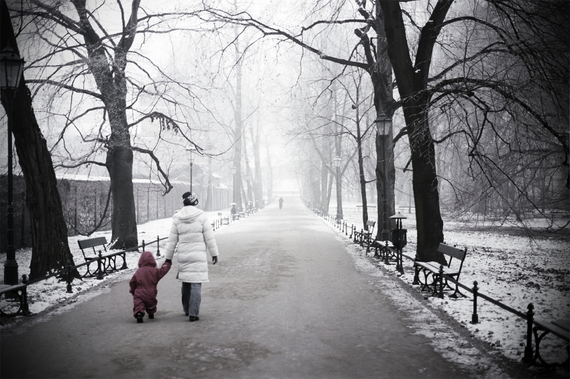"What if... I drop him?" "What if... she rolls off the bed and I'm not there to catch her?" "What if... I turn my back and he hits his head?" "What if... I make a... mistake?"
The 'What Ifs' of motherhood can boil down to instinctual anxiety about our children's safety, the drive to protect, and awareness that we can't stave off every hazard. Anxiety is often considered the enemy, something to be avoided. However, in many ways, maternal predisposition to anxiety can be seen as a positive, adaptive process.
Moms Are Supposed To Worry
Walking into a room, before putting a toddler down to play, what happens? We scan for small choke-able objects, sharp edges, uncovered outlets -- any preventable danger. By considering every 'What If' we proactively prevent a bad outcome.
However, sometimes that same naturally arising concern can go into overdrive and become overwhelming. This is the point where anxiety goes from helpful to harmful.
Anxiety On Overdrive
Before giving birth to her second child nearly a year ago, WS rarely felt overwhelmed or anxious. Yet, over the last year she has been increasingly worried about almost everything. Did her 5 year old daughter wear a warm enough jacket? Had her baby slept or eaten enough? Every time she looked at her two healthy children, her thoughts increasingly turned to their fragility, and her heart rate seemed to go up a beat.
Her husband tried to reassure her, but this did little to help. She often chalked up her increased anxieties to sleep deprivation. And, between juggling two kids and work, she often felt a few, if not many, steps behind.
WS and her daughter were at the playground one very cold, clear February morning. She had left the baby at home with her husband with some trepidation. She reassured herself that her husband was more than capable, and it was too cold out for a little baby, yet she couldn't shake the fear that something bad might happen.
The cold, clear air helped, and she relaxed a bit as she and her daughter talked and walked towards the playground.
Once they arrived at the park, her daughter went off to the regular work of childhood -- climbing, swinging, and scaling the walls of the jungle gym. On the outside, WS looked the part of the Regular Mom, but inside, a slow motion horror picture started rolling in her mind.
"What if..." She watched her daughter move higher and higher up a ladder, and then saw a mental image of her falling -- "what if..." Her daughter's body losing its balance in space, trying desperately to get there in time, being too slow, too far away -- watching her sweet girl's head hit the pavement, seeing blood.
Thud thud thud. She felt her heart beating harder and faster. She felt the park spinning around her, the branches of the bare trees seemingly blending into one. She held onto the bench to steady herself. Beads of sweat froze on her forehead. Dread rose up from her stomach into her throat. She raced across the park, as if flying to catch her daughter. But her daughter wasn't falling.
"We have to go home now," she almost begged, breathless from her cross-park sprint. But when she looked at her little girl's face, which had dropped at the thought of leaving, she realized she had to get a hold of herself. As soon as they got home, WS turned to her husband and asked for help. It was the calmest she had been in months and proved to be the most meaningful request she had ever made.
How Much Is Too Much?
What takes the garden-variety, day-to-day form of anxiety and pushes it into the more negative and debilitating type experienced by WS? When is anxiety a liability instead of an asset?
The issue can be when anxiety goes from transient, momentary thoughts (i.e. normal, adaptive) to a more pervasive and functionally impairing state. Similarly, and likely of greater import, if you are no longer able to relax and enjoy your child, play on the floor, and just laugh and have fun, then anxiety has seems to have become overwhelming and you should consider professional help. If sleep, work and/or your marriage or social life is constantly impacted by anxiety, then something has to give. Children of all ages can feel and respond to their mother's anxiety, and it can have significant negative implications for them. Thus, treatment is a necessary step.
In the next post, I will discuss five steps to help regain control of excessive anxiety, so stay tuned...
___________________
If you are experiencing symptoms of postpartum depression or anxiety, please reach out to your health care provider.
If you -- or someone you know -- need help, please call 1-800-273-8255 for the National Suicide Prevention Lifeline. If you are outside of the U.S., please visit the International Association for Suicide Prevention for a database of international resources.

